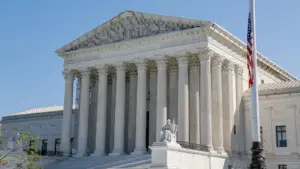The refusal to review the Juliana case marks a significant moment in climate litigation, influencing future legal strategies while highlighting the ongoing need for political engagement on environmental issues.
Supreme Court Declines to Hear Landmark Climate Case, Ending Juliana v. United States

Supreme Court Declines to Hear Landmark Climate Case, Ending Juliana v. United States
The Supreme Court's decision ends a decade-long legal battle initiated by youth activists against the federal government on climate policies.
The Supreme Court announced on Monday that it would not hear an appeal in the landmark climate lawsuit, Juliana v. United States, effectively concluding the case after a lengthy ten-year journey. The lawsuit, filed by 21 young activists, claimed that government policies promoting fossil fuel use infringe on their constitutional rights. While the court's decision marks an end for this particular case, it has inspired numerous other climate lawsuits that have seen varying degrees of success.
In 2020, the United States Court of Appeals for the Ninth Circuit ruled against the plaintiffs, stating that the judicial system is not the proper venue for resolving climate change matters. Judge Andrew D. Hurwitz indicated that the plaintiffs' arguments for redress would need to go before the political branches of government instead.
Represented by Our Children’s Trust, a nonprofit law firm based in Eugene, Oregon, the young plaintiffs made a final appeal last year, asking the Supreme Court to vacate the lower court’s ruling. Unfortunately, their petition was denied on Monday. Some legal experts had raised concerns that pressing the Supreme Court to take on the appeal could pose risks, given the current conservative majority that might consider undermining established environmental regulations.
The Juliana case has played a critical role in shaping climate litigation strategies across the country, setting a precedent that others may seek to follow despite this setback. For now, youth activists and environmental advocates are reminded of the importance of ongoing political advocacy in addressing climate issues, given the challenges faced in the judicial arena.
In 2020, the United States Court of Appeals for the Ninth Circuit ruled against the plaintiffs, stating that the judicial system is not the proper venue for resolving climate change matters. Judge Andrew D. Hurwitz indicated that the plaintiffs' arguments for redress would need to go before the political branches of government instead.
Represented by Our Children’s Trust, a nonprofit law firm based in Eugene, Oregon, the young plaintiffs made a final appeal last year, asking the Supreme Court to vacate the lower court’s ruling. Unfortunately, their petition was denied on Monday. Some legal experts had raised concerns that pressing the Supreme Court to take on the appeal could pose risks, given the current conservative majority that might consider undermining established environmental regulations.
The Juliana case has played a critical role in shaping climate litigation strategies across the country, setting a precedent that others may seek to follow despite this setback. For now, youth activists and environmental advocates are reminded of the importance of ongoing political advocacy in addressing climate issues, given the challenges faced in the judicial arena.





















